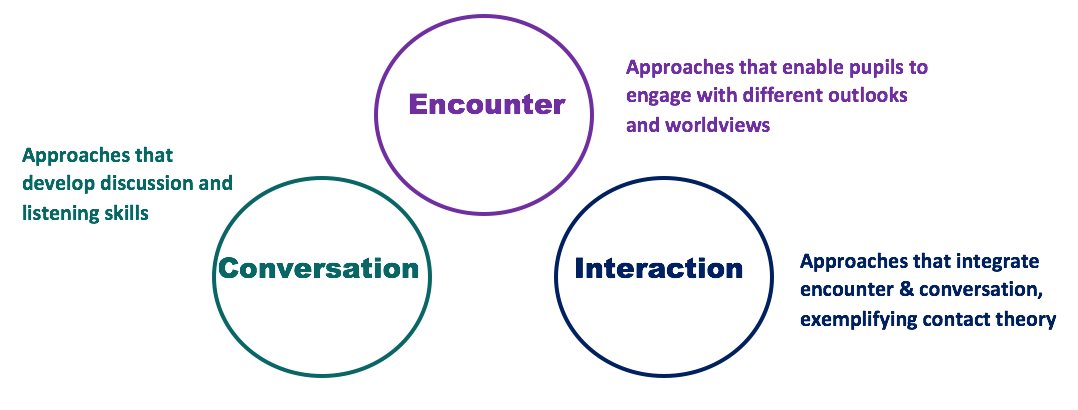Encounter, conversation and interaction: Improving community relations through religious education
Schools and teachers are in a unique position to improve community relations. This briefing calls for policy changes in order to harness these opportunities.
About the research
The UK is ethnically diverse: approximately 19% of the resident population identify as ethnic minorities (ONS, 2015).
This diversity brings social tension; in 2015/16 62,518 hate crimes were recorded by the police in England and Wales, of which 86% were racially or religiously motivated (ONS, 2016).
Understanding how to promote positive community relations in the UK is of urgent importance for current and future generations.
It is widely accepted that encouraging diverse groups to engage in meaningful interactions, under favourable conditions, is found to reduce prejudice between groups. This is known as the ‘contact hypothesis’ (Allport, 1954).
Education has been identified as a public place where those kinds of interactions might occur.
Religious Education in particular has been singled out as a curriculum subject in which positive community relations might be fostered by pupils learning about different worldviews (Orchard, 2015).
It is unclear, however, how aware teachers are of contact theory and how they apply it in their lessons.
This research examined the extent to which teachers of Religious Education (RE) understand, see the relevance of and apply the contact hypothesis to their practice.
It also highlights what needs to be done in order to further improve community relations through teacher practice.
Policy implications
• If schools are to be recognised as places that promote positive community relations, the Department for Education should ensure that teachers have the time and resources they need to promote positive community relations in the school ethos and across the curriculum. Ofsted should reintroduce the monitoring of this statutory duty through school inspections.
• Although RE provides distinctive opportunities to promote positive community relations, this is not the sole purpose of the subject and it should not be relied upon in isolation; school leaders, including headteachers and governors, should recognize that whole school effort is needed to promote positive community relations.
• Teachers in RE and beyond should be offered more and better opportunities to engage with research expertise on how to promote positive community relations during their continuing professional development, supported by resources made available online. Experienced teachers should be leading that provision in partnership with research experts.
• Both local and national policy makers should draw more on researcher expertise when it comes to developing policy measures intended to promote positive community relations in education.
Key findings
- Surveyed RE teachers recognised improving community relations to be a core aim of RE (96%).
- The majority (89%) of surveyed teachers report that they embed the contact hypothesis in practice. The majority of examples fell into three key areas: Encounter (33%), Conversation (25%), Interaction (23%), all of which need to be included in teaching and learning if warmer community relations are to be promoted.
- Teachers are interested in receiving support to embed theory into practice with 83% calling for examples of relevant classroom activities and 69% requesting general information about theory. When asked about the best ways for this information to be disseminated, surveyed teachers asked for teacher-led video clips (61%) posted on specialist websites (53%).
- New approaches to teacher education are needed which engage teachers positively with educational research of all kinds including, but not limited to, social psychology.

The graphic (above) shows the different ways through which teachers embed contact theory in their practice.
Further information
We have developed a toolkit for RE teachers at both primary and secondary levels, outlining practical ways in which contact theory can be embedded within schools and classrooms.
Authors
Dr Shelley McKeown Jones, Dr Janet Orchard, Dr Amanda Williams (University of Bristol);
Dr Kathryn Wright (Diocese of Norwich); Ms Kate Christopher (RE Today);
Dr Rachael Jackson-Royal (NATRE executive and Head of Religious Education)
